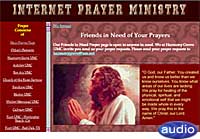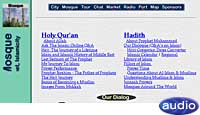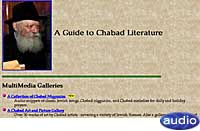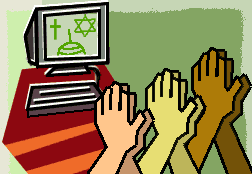
Rabbis Lecture, Churches Chat
I-Way to Heaven
“This is an extension of the Church's mission, and that is evangelization, the spreading of the good news”
— Matt Doyle, Raleigh Catholic Diocese site administrator
 Harmony Grove UMC Robert Strotman: The church must be represented on the Internet 439k (wav) (RealAudio) |
![]()
 Diocese of Raleigh Matt Doyle: The Internet is as flexible as your imagination 431k (wav) (RealAudio) |
![]()
 IslamiCity Muhammad Musri: The Internet will enhance Muslim religious life 420k (wav) (RealAudio) |
![]()
 Chabad-Lubavitchers in Cyberspace Yosef Kazen: This is an opportunity to learn more about godliness 331k (wav) (RealAudio) |
![]()
 (M.
Triandafellos/ABCNEWS.com) (M.
Triandafellos/ABCNEWS.com) |
By Gayle Tzemach
ABCNEWS.com
Mention Mass to most Catholics, and modems
and “streaming audio” don’t exactly leap
to mind.
But the
diocese of Raleigh, N.C., like many other religious
organizations, is using the World Wide Web to change the
way people worship. Now, parishioners can log on to hear
mass live through RealAudio, one of a handful of programs
that let people listen online—live or later.
“Broadcasting mass on radio
and television is a longstanding tradition within the
Catholic Church,” says Matt Doyle, the Raleigh
site’s chief architect. “It would only be a
natural step to take it to the next available medium, and
that is the Internet. It gives us another tool with which
to reach out to people.”
While weekly church attendance
in the U.S. has slipped to its lowest level in more than
40 years, hundreds of thousands of religious Web sites
are enjoying more traffic than ever. It’s not only
Catholics. Muslims, Jews, Evangelical Christians and
Buddhists, among others, are now moving beyond offering
basic information and have entered the realm of truly
interactive electronic prayer.
Everything but
Communion
The year-old Raleigh program, designed to reach the sick,
elderly and others who would be otherwise unable to
attend mass in person, also offers sermons, reflections
from clergy—everything but the sacraments.
“This is an extension of
the Church’s mission,” Doyle says, “and
that is evangelization, the spreading of the good
news.”
Other organizations have set up
entire virtual communities. In Lilburn, Ga., the Harmony
Grove United Methodist Church’s Internet Prayer List
offers a place for those in need to send their thoughts
and reflections via e-mail. These prayers are then posted
on the site for others to read. The site also enlists the
faithful to join in a church-sponsored Christian chat.
“The prayer pages serve as
an outlet for people who may not be active in a church,
but yet feel like they need the Christian community to
pray for them,” Harmony Grove site administrator Bob
Strotman says. The site “becomes more than just an
advertisement for your church, but allows you to have a
little ministry at the same time.”
IslamiCity goes further, with a
chat room connecting Muslims worldwide, along with
streaming audio versions of Radio Islam and an online
prayer area. IslamiCity visitors can also have their
questions on Islam answered in the “Ask the
Imam” section.
Muhammad Musri, one of the
clerics who receives these e-mailed queries, says his
site has grown so popular—100 messages a
week—that he’s asked to hire three or four more
people to ease the load.
“I think it’s one
fantastic way to connect people, to answer questions, to
get people more informed,” Musri says. “We try
to show through (the site) the different dimensions
within Islam.”
Enhance, Not Replace
Educating readers on the many aspects of religious life
is also Yosef Kazen’s goal. Kazen, the activities
director for the Chabad-Lubavitchers in Cyberspace,
offers a prayer area, streaming audio of various
lectures, and online religious classes.
“I find this to be the best
thing for religion,” Kazen says. “Our basic
objective is to take 3,000 years of Jewish history, and
make it available to people.”
Those who run the sites
responsible for bringing religion to the Web, that is the
key to the success of online worship. And they stress
that their own offerings of virtual religion should
reinforce, not replace, the real thing.
“This is not how you fully
experience the worship experience,” says Doyle, the
RealAudio mass provider. “This does not take the
place of church. It is not there to suggest that people
can turn this on, listen to it, and somehow meet their
Sunday obligation.”
And while some may see the Net
as an unlikely home for serious religious reflection,
those who provide the service are hearing little
criticism. In fact, they say they already have ideas in
mind for increased interactivity in the years ahead.
“As people are going to
become more involved at their own level in understanding
what Judaism has to offer them, people living in remote
areas will come together,” says Kazen.
“It’s not going to replace, it’s going to
enhance.”

